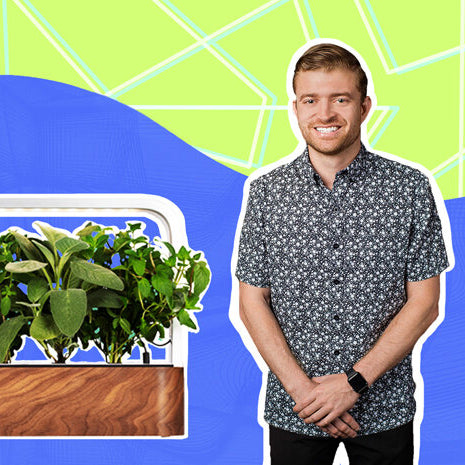
Written by Kendall Embs for Radiche
It's a commonly held belief - no home or office is complete without a little foliage. Indoor plants reduce the stress of those around them, purify the air, and provide a sense of purpose to their caretakers. Those benefits, as well as the opportunity to grow herbs or leafy greens, make healthy plants a highly desired item for apartment dwellers and people looking to bring the outdoors inside. Founder and CEO Ryan Woltz combined his engineering background and love of nature to create ēdn, a complete indoor gardening system that enables anyone to grow a variety of plants on their countertop.
From his time as a collegiate serial entrepreneur through the ringer of Shark Tank, we got the inside scoop from Ryan on ēdn’s origins and what we can expect as the innovative company grows (pun intended).
“As a young kid, I was always super interested in computers and robots, that type of stuff, but also being outside in nature.” - Ryan
When looking back at his childhood, Ryan showed the signs of a budding founder as early as the 3rd grade when he participated in an entrepreneurship program at his elementary school in Pittsburg. His early endeavors and participation in sports fostered his competitive edge, and while at Clemson for college he simultaneously ran several businesses. Talk about being a hustler!
“I had a newspaper, a t-shirt company, a moving company, we made ice luges, I also made jewelry,” Ryan said. “The newspaper advertised parties, and I was the social chair that planned those parties. I had a pretty good business going on.”

Ryan also dove deep into studying civil engineering and spent the money he made in his businesses experimenting with chemicals in thermochromic dye and color-changing fabrics. The application he was ideating was totally novel at the time but was later commercialized by several companies that took it to market separately from his collegiate experiments.
The Aha Moment
“I thought being a civil engineer meant I'd be outdoors solving problems, but I started missing nature,” Ryan said. “I bought houseplants, but I always forgot to water them and take care of them. As opposed to running out and getting more plants each time I was forgetful, I thought there had to be a better way.”
Ryan had worked as an engineer for over two years when he built and programmed his own automatic watering system for his once-neglected houseplants.
“It looked crazy at the time but I thought it had potential. I could no longer screw up gardening,” Ryan said.
In 2015, with the idea for ēdn and an early prototype under his belt, Ryan quit his day job and chose Denver as the city where he was going to build his company. He began developing different solutions for indoor gardening and got into Techstars where he had a crash course in pitching, team building, and goal setting. For Ryan, one accelerator was not enough - he also took his company through the XRC Labs program!
“Being ok with failure is important, that's the only way you will succeed.”

In 2017 Ryan had just closed his first round of funding for ēdn when he had the opportunity to pitch on the TV show Shark Tank. He showcased the prototype for ēdn’s SmallGarden, which is a tech-enabled planter that gives its users an instant green thumb with built-in lights and soilless seed pods.
Ryan gave us a behind-the-scenes review of the Shark Tank process, which starts with a pitch to producers that results in many participants being cut before pitching the Sharks. The final pitch lasts over an hour, and Ryan successfully obtained 2 offers before declining to take any funding (note to Shark Tank junkies - the terms offered are notoriously unfavorable to the entrepreneurs). With four months until the episode aired, Ryan had to produce the SmallGarden on an aggressive schedule to meet the demand that would come from exposure on the show.
“We got 1000 units made. I set up an assembly line, warehouse, and we manufactured them all in Colorado,” Ryan said. “I learned a ton about building products at scale, and when you make them yourself you realize they should be as simple as possible. When Shark Tank aired we sold $100,000 worth of gardens.”
By the summer of 2018 ēdn had developed its next iteration of the SmallGarden, which added functionality and is controlled via a convenient app. The app allows users to control the amount of light exposure and water release which ultimately controls how fast or slow your plant grows. Hence, if you are traveling and won’t be back for some time, you can slow down the growth for your lovely fruits and vegetables so that they don’t go to waste.
“We completely simplified it - it has only 16 parts, which include the automated garden, LEDs, water sensors and wifi connection. We injection-molded all of our plastic this time,” Ryan said.
“This operating system brings nature indoors and into the 21st century.”

Ryan’s time is now focused on positioning ēdn to be the best choice for people who want to bring the joy of plants into their homes.
“People love plants for so many different reasons,” Ryan said. “ You can eat them, but they also are beautiful, they can make you more productive, they smell nice. There are all the use cases and we don’t want to be scattered in our approach.”
ēdn is planning to roll out more ways for people to win the green thumb war. Keep an eye out for larger plants in the product line, and for talk of ēdn in the press. They’ve been featured on the Today Show, and continuously get organic media traction.
“We’ve been super lucky - people are really interested in our space. I think the product and the vision has a lot to do with it,” Ryan said.
The Advice
By our calculation, Ryan is at least a fifth-time founder! Here are his tips for anyone at the helm of a burgeoning business:
-
As the CEO you have to work on the business, not in the business.
-
Be confident in yourself but lean on your support system.
-
Spend time building your time and realize you can’t do everything yourself.
-
Understand that you are going to wear many hats as a founder and business leader.
Written by Kendall Embs for Radiche








